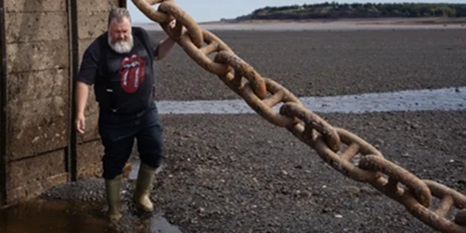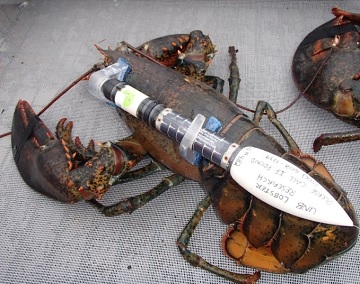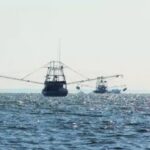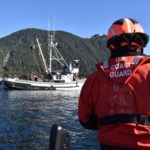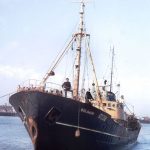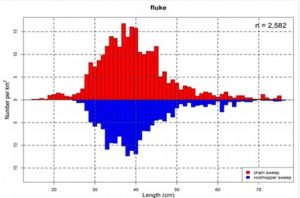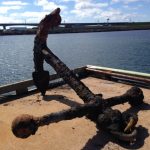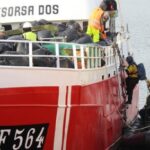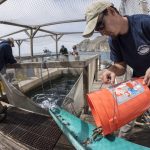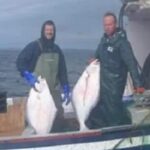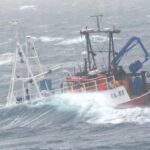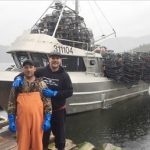Tag Archives: Bay of Fundy
The cost of Maine scallops
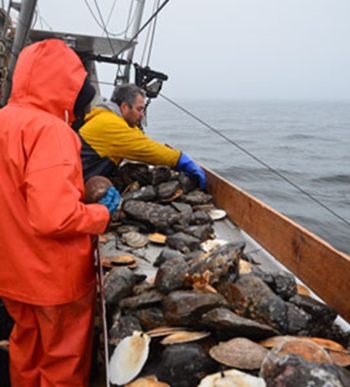 If you’ve got a yen for succulent, right-off-the-boat Maine sea scallops, now is the time to get them. Most consumers can’t get scallops that really are “right off the boat” unless they live in the Midcoast or Downeast and, perhaps, know a fisherman. For those with the opportunity, it’s well worth a drive down to the harbor to buy a gallon or two of freshly shucked scallops when the boats come back from fishing. Even if they’re not right off the boat, good, fresh scallops are readily available, if expensive. In Portland, the waterfront Harbor Fish Market was recently offering fresh “dayboat” scallops at $32.99 per pound for “mediums”—a mix of 10-20 per pound—and $38.99 for “jumbos” all weighing in at fewer than a dozen per pound. Photos, more, >>CLICK TO READ<< 06:23
If you’ve got a yen for succulent, right-off-the-boat Maine sea scallops, now is the time to get them. Most consumers can’t get scallops that really are “right off the boat” unless they live in the Midcoast or Downeast and, perhaps, know a fisherman. For those with the opportunity, it’s well worth a drive down to the harbor to buy a gallon or two of freshly shucked scallops when the boats come back from fishing. Even if they’re not right off the boat, good, fresh scallops are readily available, if expensive. In Portland, the waterfront Harbor Fish Market was recently offering fresh “dayboat” scallops at $32.99 per pound for “mediums”—a mix of 10-20 per pound—and $38.99 for “jumbos” all weighing in at fewer than a dozen per pound. Photos, more, >>CLICK TO READ<< 06:23
Industry withholding data on one of Canada’s largest fisheries, advocates say
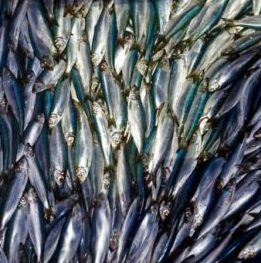 Advocates and scientists are raising concerns with the availability of data on one of Canada’s largest fisheries, as the Department of Fisheries and Oceans DFO is waiting on industry to provide data on the herring fishery in southwest Nova Scotia and the Bay of Fundy. For decades, herring stock has been declining and has been in the critical zone since 2018. In July, DFO reduced the total allowable catch to 16,000 tonnes per season, from 21,000, fixing the quota at the reduced level until 2027. Since then, advocates say the Herring Science Council — an industry body that, through an agreement with DFO, gathers the data that’s the only source of scientific information on the fishery — has not provided to the department the information it has collected. more, >>CLICK TO READ<< 08:12
Advocates and scientists are raising concerns with the availability of data on one of Canada’s largest fisheries, as the Department of Fisheries and Oceans DFO is waiting on industry to provide data on the herring fishery in southwest Nova Scotia and the Bay of Fundy. For decades, herring stock has been declining and has been in the critical zone since 2018. In July, DFO reduced the total allowable catch to 16,000 tonnes per season, from 21,000, fixing the quota at the reduced level until 2027. Since then, advocates say the Herring Science Council — an industry body that, through an agreement with DFO, gathers the data that’s the only source of scientific information on the fishery — has not provided to the department the information it has collected. more, >>CLICK TO READ<< 08:12
DFO to increase year-round lobster gear monitoring in Bay of Fundy
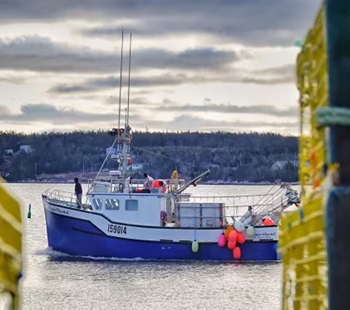 Enforcement officers with the federal Department of Fisheries and Oceans will soon have a new tool to lift, check and seize illegal lobster fishing gear from the waters between Nova Scotia and New Brunswick. The department is seeking a crew and vessel that would be contracted to take DFO officers on patrols to inspect fishing equipment. The patrol work isn’t new, but this contract represents an increase in surveillance and enforcement in an area where the fishing industry has called on officers to do more to deter illegal fishing operations. The contracted vessel would be responsible for patrolling throughout the Bay of Fundy and “be able to berth at various ports in New Brunswick and Nova Scotia,” according to the documents published online. more, >>CLICK TO READ<< 07:33
Enforcement officers with the federal Department of Fisheries and Oceans will soon have a new tool to lift, check and seize illegal lobster fishing gear from the waters between Nova Scotia and New Brunswick. The department is seeking a crew and vessel that would be contracted to take DFO officers on patrols to inspect fishing equipment. The patrol work isn’t new, but this contract represents an increase in surveillance and enforcement in an area where the fishing industry has called on officers to do more to deter illegal fishing operations. The contracted vessel would be responsible for patrolling throughout the Bay of Fundy and “be able to berth at various ports in New Brunswick and Nova Scotia,” according to the documents published online. more, >>CLICK TO READ<< 07:33
Lack of fishing prohibitions in ‘grey zone’ could pose risk for right whales, expert says
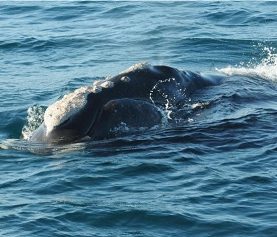 One marine conservation expert has questions about the efforts on the part of Fisheries and Oceans after North Atlantic right whales were detected in the Bay of Fundy in recent weeks, including in an area where both Canadian and American fishermen catch lobster. In October, Fisheries and Oceans announced several temporary prohibited fishing areas as the whales were detected in multiple fishing spots across the Maritimes, including in the bay. Some fishing prohibitions for parts of the Bay of Fundy started on Oct. 25 and included the fisheries for crab, herring, mackerel, groundfish, hagfish and lobster. The so-called “grey zone” is an area of disputed water near Grand Manan. Both Canada and the United States have claimed sovereignty over the area, so fishers from both countries harvest there. more, >>CLICK TO READ<< 07:57
One marine conservation expert has questions about the efforts on the part of Fisheries and Oceans after North Atlantic right whales were detected in the Bay of Fundy in recent weeks, including in an area where both Canadian and American fishermen catch lobster. In October, Fisheries and Oceans announced several temporary prohibited fishing areas as the whales were detected in multiple fishing spots across the Maritimes, including in the bay. Some fishing prohibitions for parts of the Bay of Fundy started on Oct. 25 and included the fisheries for crab, herring, mackerel, groundfish, hagfish and lobster. The so-called “grey zone” is an area of disputed water near Grand Manan. Both Canada and the United States have claimed sovereignty over the area, so fishers from both countries harvest there. more, >>CLICK TO READ<< 07:57
Bay of Fundy fishermen see uptick in poaching patrols
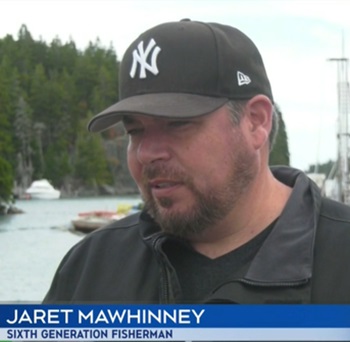 Many lobster fishermen say they have seen an uptick in Coast Guard patrols in the Bay of Fundy less than a week after a protest against poaching in Saint Andrews, N.B. “Last spring I didn’t see any fisheries on the water at all,” said Jaret Mawhinney, a sixth-generation fisherman. “Last fall I think I might have saw one boat and that was probably the first day. After that I never really seen too much.” Mawhinney notes lobster catches have dropped in recent years, something he attributes to poaching. Last Saturday, roughly 50 fishing boats from Lobster Fishing Area 36 – which covers waters from Alma to the American border – docked in Saint Andrews to peacefully protest illegal fishing and what they see as a lack of enforcement by the government. Video more, >>CLICK TO READ<< 19:32
Many lobster fishermen say they have seen an uptick in Coast Guard patrols in the Bay of Fundy less than a week after a protest against poaching in Saint Andrews, N.B. “Last spring I didn’t see any fisheries on the water at all,” said Jaret Mawhinney, a sixth-generation fisherman. “Last fall I think I might have saw one boat and that was probably the first day. After that I never really seen too much.” Mawhinney notes lobster catches have dropped in recent years, something he attributes to poaching. Last Saturday, roughly 50 fishing boats from Lobster Fishing Area 36 – which covers waters from Alma to the American border – docked in Saint Andrews to peacefully protest illegal fishing and what they see as a lack of enforcement by the government. Video more, >>CLICK TO READ<< 19:32
UPDATE: Enforcement patrols return as frustration over poaching boils over
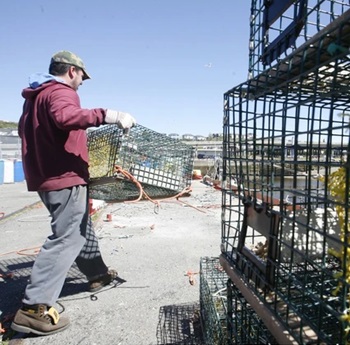 Enforcement patrols have returned to a stretch of the Bay of Fundy that local fishermen had said was left wide open to illegal fishing, including by foreign vessels. That’s after frustration over poaching had boiled over, grabbing headlines, finding its way onto the floor of Parliament, and resulting in local fishers threatening to “take matters into their own hands” this upcoming lobster season in the absence of federal enforcement. The Fundy North Fishermen’s Association says DFO has now deployed enforcement resources in an area known as Lobster Fishing Area 36 that stretches along New Brunswick’s Bay of Fundy coast from Alma to the American border. more, >>CLICK TO READ<< 07:54
Enforcement patrols have returned to a stretch of the Bay of Fundy that local fishermen had said was left wide open to illegal fishing, including by foreign vessels. That’s after frustration over poaching had boiled over, grabbing headlines, finding its way onto the floor of Parliament, and resulting in local fishers threatening to “take matters into their own hands” this upcoming lobster season in the absence of federal enforcement. The Fundy North Fishermen’s Association says DFO has now deployed enforcement resources in an area known as Lobster Fishing Area 36 that stretches along New Brunswick’s Bay of Fundy coast from Alma to the American border. more, >>CLICK TO READ<< 07:54
Trudeau Government’s Fisheries Mismanagement is Cutting Through Atlantic Canada
 Clifford Small, MP for Coast of Bays-Central-Notre Dame and Shadow Minister for Fisheries, Oceans and ick Perkins,The Canadian Coast Guard; Rick Perkins, MP for South Shore-St. Margarets and Shadow Minister for Innovation, Science and Industry; John Williamson, MP for New Brunswick Southwest; Chris d’Entremont, MP for West Nova, and the Hon. Rob Moore, MP for Fundy Royal, released the following statement: “After nine years of Justin Trudeau, the Liberal Government’s job-killing agenda is cutting through Atlantic Canada. Liberal failure to stop illegal lobster fishing is delivering hardship for our coastal communities along the Bay of Fundy. more, >>CLICK TO READ<< 13:47
Clifford Small, MP for Coast of Bays-Central-Notre Dame and Shadow Minister for Fisheries, Oceans and ick Perkins,The Canadian Coast Guard; Rick Perkins, MP for South Shore-St. Margarets and Shadow Minister for Innovation, Science and Industry; John Williamson, MP for New Brunswick Southwest; Chris d’Entremont, MP for West Nova, and the Hon. Rob Moore, MP for Fundy Royal, released the following statement: “After nine years of Justin Trudeau, the Liberal Government’s job-killing agenda is cutting through Atlantic Canada. Liberal failure to stop illegal lobster fishing is delivering hardship for our coastal communities along the Bay of Fundy. more, >>CLICK TO READ<< 13:47
Editorial: Ottawa must answer the bell on lobster poaching
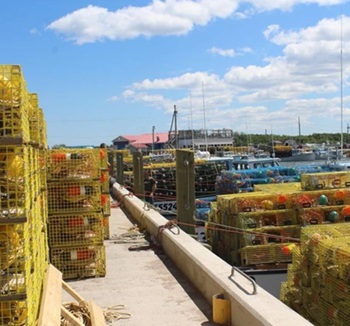 The federal government must do more to address complaints about out-of-season fishing and lobster poaching in the Bay of Fundy – issues that have come to public attention in the last couple of weeks as fishing operators in New Brunswick and Nova Scotia plead for better enforcement. Clearly something is amiss when you have local business owners threatening to take matters into their own hands by pulling up illegal gear – an action that may spark confrontations on the water or at wharves along the Fundy coast. The Nova Scotia fisheries minister has lent further credence by writing to his federal counterpart, warning of an underground fishery and reports of threats and intimidation for speaking out. more, >>CLICK TO READ<< 15:18
The federal government must do more to address complaints about out-of-season fishing and lobster poaching in the Bay of Fundy – issues that have come to public attention in the last couple of weeks as fishing operators in New Brunswick and Nova Scotia plead for better enforcement. Clearly something is amiss when you have local business owners threatening to take matters into their own hands by pulling up illegal gear – an action that may spark confrontations on the water or at wharves along the Fundy coast. The Nova Scotia fisheries minister has lent further credence by writing to his federal counterpart, warning of an underground fishery and reports of threats and intimidation for speaking out. more, >>CLICK TO READ<< 15:18
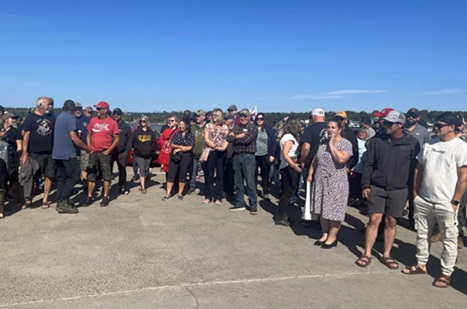
More calls for Canada’s Fisheries Minister to resign
There are growing calls for Canada’s fisheries minister to step aside from her role. Around 50 lobster fishers from across southern New Brunswick gathered in Saint Andrews on Saturday for a peaceful protest. The fishers said they are fed up with continued mismanagement of the industry and failure to address critical issues. The protest was organized by the Fundy North Fishermen’s Association, which represents fishers in Lobster Fishing Area 36. The association claims there is a lack of enforcement in the fishing area, which extends from Alma to St. Stephen, leading to illegal fishing and buying activities. Fishers are calling on the minister to acknowledge the mismanagement, provide a solution and step aside from her role. more, >>CLICK TO READ<< 13:39
Lobster harvesters ready to ‘take matters into their own hands’
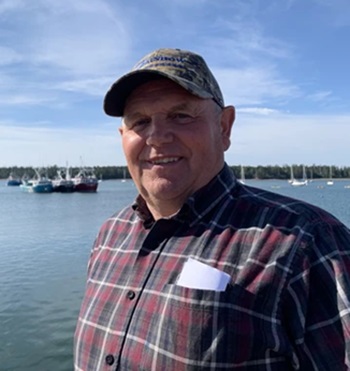 Local lobster harvesters are prepared to patrol waters themselves and haul up illegal gear, which could spark confrontations with poachers, according to Amanda Johnson, executive director of the Fundy North Fishermen’s Association, which represents 150 lobster fishers from St. Stephen to Alma. “It could lead to a lot of violence on the water,” Johnson said at a protest held in Saint Andrews Saturday in support of local fishers and their families. Maine and New Brunswick poachers are now taking to Lobster Fishing Area 36, which runs along New Brunswick’s Bay of Fundy coast from Alma to the American border, ahead of its November season, Johnson said. Deer Island fisherman Dale Mitchell claims lobster catches have dropped 30 per cent in the last seven years since the start of what he called an “illegal summer fishery” in the region. more, >>CLICK TO READ<< 08:06
Local lobster harvesters are prepared to patrol waters themselves and haul up illegal gear, which could spark confrontations with poachers, according to Amanda Johnson, executive director of the Fundy North Fishermen’s Association, which represents 150 lobster fishers from St. Stephen to Alma. “It could lead to a lot of violence on the water,” Johnson said at a protest held in Saint Andrews Saturday in support of local fishers and their families. Maine and New Brunswick poachers are now taking to Lobster Fishing Area 36, which runs along New Brunswick’s Bay of Fundy coast from Alma to the American border, ahead of its November season, Johnson said. Deer Island fisherman Dale Mitchell claims lobster catches have dropped 30 per cent in the last seven years since the start of what he called an “illegal summer fishery” in the region. more, >>CLICK TO READ<< 08:06
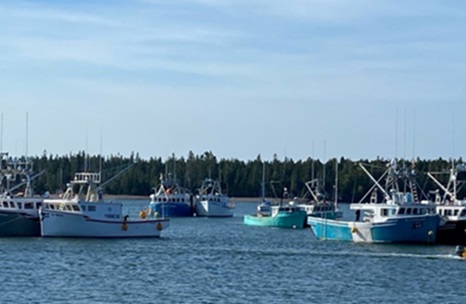
New Brunswick fishermen fill St. Andrews Wharf Saturday as they call for change on the water
It’s not what you expect to see in St. Andrews but mixed in amongst the whale watching boats and small vessels, dozens of lobster fishing boats docked along the wharf Saturday. Local fishermen from Lobster Fishing Area 36, which covers waters from Alma to the American boarder including Deer Island and Campobello Island, and their families filled both the water and the wharf as they called for change out on the water. The protest is against what they believe is inaction by the government and a collective call for the Minister of Fisheries and Oceans, Diane Lebouthillier, to resign. “We believe that she is not capable of protecting our fishery and protecting our resource,” said Fundy North Fishermen’s Association executive director, Amanda Johnson. more, >>CLICK TO READ<< 18:26
Lawsuit alleges Cooke Aquaculture using shell companies to skirt U.S. law
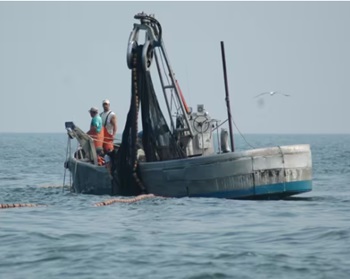 Cooke Aquaculture, one of New Brunswick’s largest companies, has asked for dismissal of a U.S. lawsuit accusing it of using a complex web of shell companies to break anti-foreign ownership laws. Saint John-based Cooke Aquaculture has owned Omega Protein, in Virginia, since 2017. Omega is affiliated with another company that operates a Chesapeake Bay menhaden fishery, a small baitfish used to make fishmeal, fish oil and other products. The menhaden fishery under Omega has concerned environmental activists, who say the company is overfishing a fish that many species up the food chain depend on in the Chesapeake Bay, which is slightly smaller than the Bay of Fundy. The lawsuit alleges Cooke is violating the American Fisheries Act, which requires 75 per cent of a company fishing in the U.S. to be owned by a U.S. citizen. more, >>CLICK TO READ<< 07:35
Cooke Aquaculture, one of New Brunswick’s largest companies, has asked for dismissal of a U.S. lawsuit accusing it of using a complex web of shell companies to break anti-foreign ownership laws. Saint John-based Cooke Aquaculture has owned Omega Protein, in Virginia, since 2017. Omega is affiliated with another company that operates a Chesapeake Bay menhaden fishery, a small baitfish used to make fishmeal, fish oil and other products. The menhaden fishery under Omega has concerned environmental activists, who say the company is overfishing a fish that many species up the food chain depend on in the Chesapeake Bay, which is slightly smaller than the Bay of Fundy. The lawsuit alleges Cooke is violating the American Fisheries Act, which requires 75 per cent of a company fishing in the U.S. to be owned by a U.S. citizen. more, >>CLICK TO READ<< 07:35
Herring quota in southwestern Nova Scotia, Bay of Fundy, reduced again
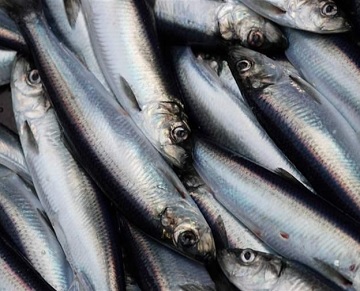 The Department of Fisheries and Oceans has again lowered the Atlantic herring quota in southwestern Nova Scotia and the Bay of Fundy, this time for 2024 to 2027. DFO has announced the total allowable catch for the fishery will be 16,000 tonnes per season over those four seasons. The 2023 allocation was 21,000 tonnes. “Atlantic herring, like many fisheries, faces challenges as a result of climate change, which has led to herring that are smaller in size and that have more difficulty surviving and reproducing in their ecosystem,” says a news release from the department. “We recognize the economic impacts this decision will have on the families and communities that rely on income from fishing and processing herring. But such a decision is necessary to ensure recovery and protect the resource for future generations,” said the DFO release. more, >>CLICK TO READ<< 16:40
The Department of Fisheries and Oceans has again lowered the Atlantic herring quota in southwestern Nova Scotia and the Bay of Fundy, this time for 2024 to 2027. DFO has announced the total allowable catch for the fishery will be 16,000 tonnes per season over those four seasons. The 2023 allocation was 21,000 tonnes. “Atlantic herring, like many fisheries, faces challenges as a result of climate change, which has led to herring that are smaller in size and that have more difficulty surviving and reproducing in their ecosystem,” says a news release from the department. “We recognize the economic impacts this decision will have on the families and communities that rely on income from fishing and processing herring. But such a decision is necessary to ensure recovery and protect the resource for future generations,” said the DFO release. more, >>CLICK TO READ<< 16:40
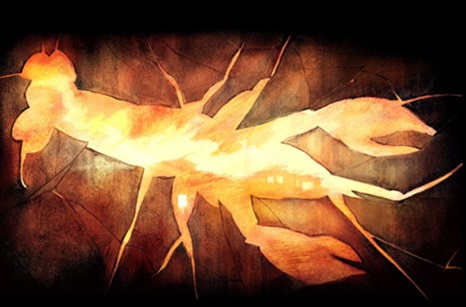
Nova Scotia’s Billion-Dollar Lobster Wars
At the River Café, the Michelin-recommended restaurant on the Brooklyn waterfront where the term “free-range chicken” was coined, the lobster is served butter-poached next to a pool of lemon-grape sauce, to brighten its tender brininess. The chef, Brad Steelman, insists on lobster from the cold waters of Nova Scotia, because this insures a hard shell and robust meat. Not so long ago, good lobster could be found closer to the city. Historically, there were strong harvests as far south as New Jersey. Private-equity firms and seafood conglomerates have swallowed many of North America’s fisheries. But, in Nova Scotia, most lobstermen are independent. But many inshore fishermen have also resisted a recent entrant to the power struggle: the Mi’kmaq, the most populous group of Indigenous people in Atlantic Canada. more, >>CLICK TO READ<< 06:58
Some N.S. lobster fishers report serious decline in catches
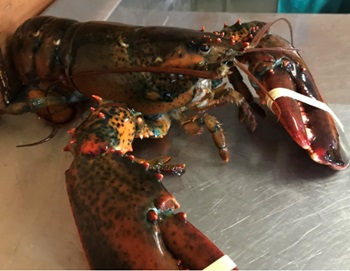 Some lobster fishers are reporting a major drop in catches this year compared to last, and they’re calling on the provincial government to drastically increase illegal fishing fines to keep the lobster population stable. Heather Mulock, executive director of Coldwater Lobster Association (opens in a new tab), said this season is one of the worst for catches in the region since the 1990s, and she attributes some of that to illegal fishing. “We saw millions of pounds of lobster that came out illegally,” she said. “Unauthorized fishing in the summer and fall affected us.” “We’re in the process of a regulatory review that will include updates to the Nova Scotia Fisheries and Coastal Resources Act(opens in a new tab),” he said. “Provincial fines for offences under the Act are part of this review.” more, >>click to read<< 14:21
Some lobster fishers are reporting a major drop in catches this year compared to last, and they’re calling on the provincial government to drastically increase illegal fishing fines to keep the lobster population stable. Heather Mulock, executive director of Coldwater Lobster Association (opens in a new tab), said this season is one of the worst for catches in the region since the 1990s, and she attributes some of that to illegal fishing. “We saw millions of pounds of lobster that came out illegally,” she said. “Unauthorized fishing in the summer and fall affected us.” “We’re in the process of a regulatory review that will include updates to the Nova Scotia Fisheries and Coastal Resources Act(opens in a new tab),” he said. “Provincial fines for offences under the Act are part of this review.” more, >>click to read<< 14:21
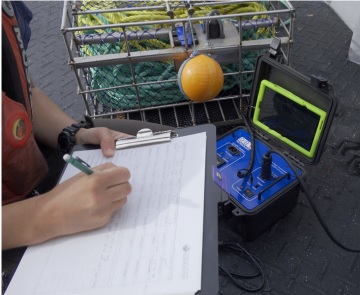
Gear-lending program has harvesters working through closures and trying ropeless fishing gear without commitment
Snow crab fishers in one area of Nova Scotia had a new visitor this season and found themselves closed out of their fishing waters. “We got a 37 percent cut in our quota and [Northern right] whales presented themselves in our zone for the first time ever so [it was] quite stressful,” said Marc Lefort, a snow crab harvester in western Cape Breton Island and a member of Area 19 Snow Crab Fishermen’s Association in Cheticamp, N.S. He’s been fishing for 19 years in the area. “It was a challenging season.” The Northern right whale is critically endangered and conservation efforts have targeted fisheries using fixed gear, or traps connected to buoys by rope. Because whales can be entangled in the fishing gear, fisheries for lobster and snow crab have been forced to think of new measures – and new fishing gear – to protect the marine mammals. >>click to read<< 12:24
4 North Atlantic right whales spotted in Bay of Fundy
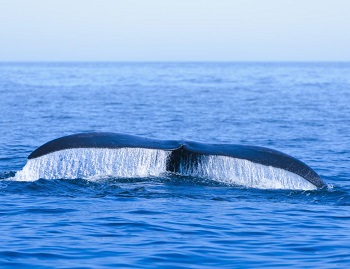 Four North Atlantic right whales were spotted Saturday in the Bay of Fundy — the first documented sighting of the species in that area this year. “Every sighting is very important,” said Dion, noting how few North Atlantic right whales exist. Dion said she and the team quickly began documenting the sightings and called the Canadian Whale Institute for official documentation. The Department of Fisheries and Oceans was also contacted, along with Fundy Traffic. They were able to identify the four whales as North Atlantic right whales, a welcome confirmation. >>click to read<< 19:04
Four North Atlantic right whales were spotted Saturday in the Bay of Fundy — the first documented sighting of the species in that area this year. “Every sighting is very important,” said Dion, noting how few North Atlantic right whales exist. Dion said she and the team quickly began documenting the sightings and called the Canadian Whale Institute for official documentation. The Department of Fisheries and Oceans was also contacted, along with Fundy Traffic. They were able to identify the four whales as North Atlantic right whales, a welcome confirmation. >>click to read<< 19:04
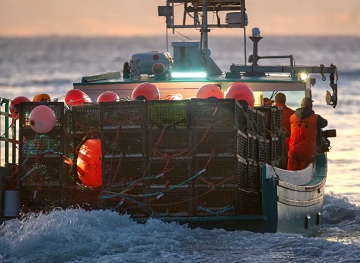
It’s time for Canada to relax fishery closures around right whale sightings, committee says
The standing committee on fisheries and oceans is recommending that the federal government relax the fishing closures it imposes when endangered North Atlantic right whales are sighted in Canadian waters. In a report released Tuesday, the committee said the Department of Fisheries and Oceans Canada should modify its rules for the 2023 season in the Gulf of St Lawrence, Bay of Fundy and Roseway Basin off southern Nova Scotia since most single-whale detections are animals in transit and not staying to feed. It also says season-long closures should rarely be imposed. >click to read< 07:20

Transport Canada must be ‘more vigilant,’ relatives say two years after N.S. sinking
“My father said, ‘After this trip, this was it,’ because it was quite dangerous,” Michael Francis said during a recent interview at his home in Milton, N.S., a few weeks before the second anniversary of the sinking of the Chief William Saulis. The bodies of Eugene (Geno)Michael Francis, Aaron Cogswell, Leonard Gabriel, Dan Forbes and captain Charles Roberts were never recovered after the 17-metre vessel capsized on Dec. 15, 2020, just off Delaps 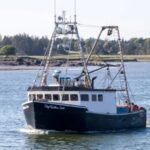 Cove, about 50 kilometres north of Digby, N.S. The body of crew member Michael Drake was swept up on the rocky shoreline. Two years later, Francis and Lori Phillips, the mother of Cogswell, say Dec. 15 is a date that provokes painful memories, unanswered questions and frustration over a Transportation Safety Board investigation that still hasn’t officially delivered its findings. >click to read< 08:43 >Search Results for Chief William Saulis<
Cove, about 50 kilometres north of Digby, N.S. The body of crew member Michael Drake was swept up on the rocky shoreline. Two years later, Francis and Lori Phillips, the mother of Cogswell, say Dec. 15 is a date that provokes painful memories, unanswered questions and frustration over a Transportation Safety Board investigation that still hasn’t officially delivered its findings. >click to read< 08:43 >Search Results for Chief William Saulis<

Management Plan Released for Atlantic Herring in Southwest Nova Scotia and the Bay of Fundy
Atlantic herring is a vital species in Atlantic Canada. As one of the largest commercial fisheries in Atlantic Canada, the Southwest Nova Scotia / Bay of Fundy herring stock directly or indirectly employs more than 1,000 people in rural Nova Scotia and New Brunswick and contributes over $140 million to the local economy. Atlantic herring is also an important source of bait for other commercial fisheries, such as lobster and snow crab. Despite a number of measures taken in recent years to encourage rebuilding, the Southwest Nova Scotia / Bay of Fundy Atlantic herring stock remains in the critical zone. Stronger sustainable management actions are needed to protect this important species and return it to abundance. >click to read< 13:29
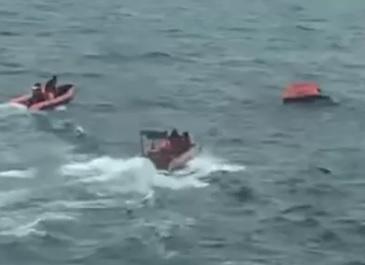
Crew from the Grand Manan Adventure ferry sped to the rescue of fishing crew on a life raft
The Joint Rescue Co-ordination Centre says it got a mayday call from the Ross Pride around noon on Wednesday. The fishing boat was taking on water and listing, said the centre’s Lt.-Cmdr. Brian Owens. “They indicated that they were going to be abandoning their vessel, getting into their life raft,” he said Thursday. Owens said the centre immediately deployed a helicopter and a Hercules aircraft out of Greenwood, N.S. The centre also asked the Canadian Coast Guard station at Westport, N.S., and the United States Coast Guard in Eastport, Maine, to head to the scene. Video, >click to read< 11:25
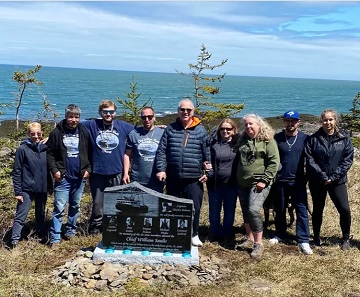
‘The spot is beautiful’: Chief William Saulis crew remembered with memorial
Lori Phillips was at a loss. She didn’t want to go to just any random cemetery and place a headstone with her son Aaron’s name on it. She would have no relationship to that spot, she says. It would just be a stone on a piece of land. Her son, Aaron Cogswell, was one of six fishermen who lost their lives in the Dec. 15, 2020, sinking of the Chief William Saulis scallop dragger. The others were Charles Roberts, Daniel Forbes, Michael Drake, Eugene Francis, and Leonard Gabriel. Phillips needed a place for her and others to remember the crew. >click to read< 09:01
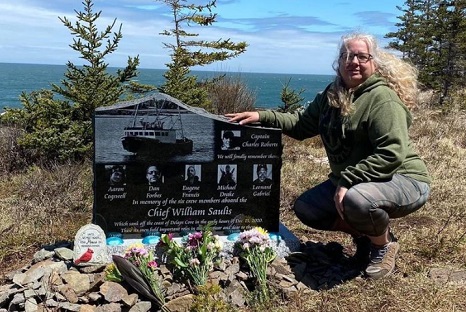
Questions linger for mother as monument erected for lost fishermen in Nova Scotia
Questions about how a scallop dragger sank suddenly in 2020 are lingering for a crew member’s mother, who this week installed a stone monument close to where the boat was lost. The bodies of Aaron Cogswell, Leonard Gabriel, Dan Forbes, Geno Francis and captain Charles Roberts were never found after the sinking of the Chief William Saulis on Dec. 15, 2020. The body of crew member Michael Drake came ashore near Delaps Cove, a coastal village about 50 kilometres north of Digby, N.S. Lori Phillips, Cogswell’s mother, has worked alongside Darlene Roberts, the wife of the captain, to create a stone memorial to honour the men on a wilderness trail within sight of the coastal waters where the dragger went down. >please click to read< 16:22
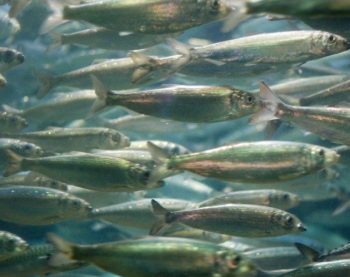
Proposed herring quota would put lobster fishermen in a pinch for bait
The Department of Fisheries and Oceans is pursuing a commercial quota on herring for areas off Southwest Nova Scotia and the Bay of Fundy. DFO is proposing the use of a new stock modeling process, that could see quotas slashed to 13,050 tonnes from 35,000 tonnes, a 62 per cent reduction. Commercial herring fishing operators have already voiced their opposition to those plans, including Bay of Fundy Herring Industry who in a statement proposed a compromise of lowering their quota to 25,000 tonnes from 35,000 tonnes for the 2022 season. >click to read< 19:52

Another big Maritime fishery quota cut looming
Another Maritime fishery is facing a big quota cut this year. The only question is how big. This time it is the large herring fishery in southwestern Nova Scotia and the Bay of Fundy. The stock is in the critical zone where serious harm is occurring, but the fishery employs hundreds of people in Nova Scotia and New Brunswick. What happens next will again test how far Canada’s fisheries minister is willing to go to rebuild a depleted stock. >click to read< 09:35
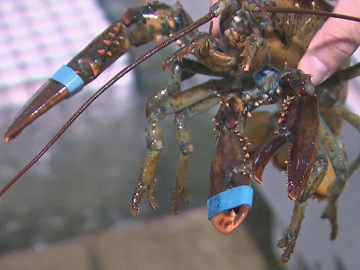
Last lobster season for ‘canners’ – More lobster is the goal
New Brunswick lobster fishermen along the Bay of Chaleur, Acadian Peninsula and Miramichi Bay are setting their traps for the 2022 season Tuesday and this is the last year they’ll be fishing for two different size and price classes. Members of the Maritime Fishermen’s Union in Lobster Fishing Area 23 voted 75 per cent in favour of phasing out the “canner” size, a spokesperson for the group confirmed. Indigenous organizations were also consulted about the change, the Department of Fisheries and Oceans said in a news release. >click to read< 12:30

Bay of Fundy Herring Industry Proposes Sustainability Plan
The Bay of Fundy Herring Industry, in collaboration with the Herring Science Council, today unveiled a plan to sustain and rebuild the herring stocks in the Bay of Fundy. The plan calls for a reduction of the TAC for the 2022 fishing season to 25,000 metric tons (“mt”) from 35,000 mt, representing a decrease of 30% from the previous year and 50% over the past five years. The plan also calls for increased management measures and scientific support by industry. >click to read< 13:38

Right whale protection measures to return ahead of migration into Canada
The federal government has announced its fishery and vessel management measures for the 2022 season to protect North Atlantic right whales as the endangered animals migrate into Canadian waters. Officials said in a statement Thursday the Fisheries Department will once again implement seasonal and temporary fishing area closures in the Gulf of St. Lawrence, the Bay of Fundy and other “critical habitat areas” where whales have previously been sighted. They also say Transport Canada is again enforcing vessel traffic measures, including speed restrictions for vessels over 13 metres long, throughout much of the Gulf starting on April 20 to better respond to right whale presence. >click to read< 08:29






